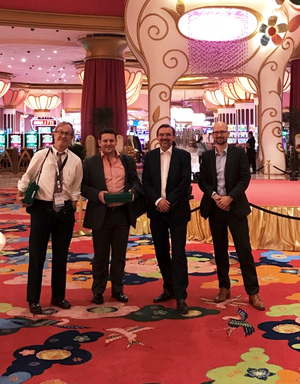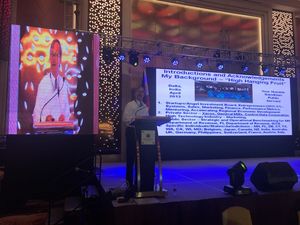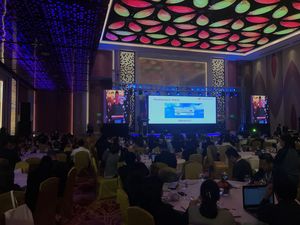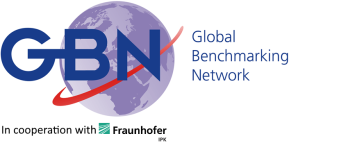11th International Benchmarking Conference in Manila, Philippines, 2017
We would like to invite you to watch the Teaser Video of the International Quality Conference on our Channel
The 11th International Benchmarking Conference was held in Manila, Philippines, in collaboration with the two strongest benchmarking organizations in Asia,
the Asia Pacific Quality Organization, and the Philippine Society for Quality.
For the Asia Pacific Quality Conference, this year’s topic “Quality transformation in the digital world” brought together experts on the future of quality and
topics such as big data, artificial intelligence, leadership shift, and organizational excellence in the digital transformation age.
The GBN contributed on topics like global benchmarking, best practices, leading culture, and manufacturing in the digital world.
The conference took place at the five-star Okada Manila Resorts World and was hosted by our member The Philippine Society for Quality.
The event targeted senior leaders in both the private and public sectors, with a distinct and unique focus on quality and transformation in the digital world,
as well as how to sustain performance excellence through benchmarking and best practices, featuring highly renowned guests from all over the world.
The conference started with an opening discussion on the “Birth and Evolution of Quality”. After a short introduction to the GBN by GBN secretary and board member Jan-Patrick Cap, GBN member and benchmarking expert Prof. Dr. Holger Kohl (Head of Corporate Management Division at Fraunhofer IPK) then opened the IBCON 2017,
followed by Dale F. Weeks (President and CEO of Global Leadership and Benchmarking Associates – GLBA) and Mark Modena (Director at Winning Moves Ltd).

Future Manufacturing in a Digital World
Prof. Dr. Kohl drew on the increasing complexity of production and product varieties leading to new value chains.
From manual manufacturing in the 1850’s to mass production in the 1950’s, we are on our way now to customer individual mass manufacturing.
Moreover, to general globalization, regionalization, and personalization. The digitally integrated, intelligent production will penetrate the whole production chain.
Digital Transformation Industrie 4.0 –Definition
The basic idea and approach of Industrie 4.0 include the implementation and use of the internet of people, things, services and processes in industry and in manufacturing companies.
As well as ubiquitous, surrounding networking, assistance, and intelligence of people, machines, objects, IT-systems.
In terms of approach, Kohl mentions the following steps:
- Horizontal integration in value-added networks,
- Vertical integration of production and IT-systems,
- Digital consistency in engineering,
- Decentralization of intelligence and functions,
- Sociotechnical system design.

Initial core technologies, such as the Internet of Things and Services, Tracking & Tracing, Smart Mobile Devices and Embedded MicroSystems and the new enabling technologies,
as Social Media, Cloud Computing, Big Data and Wireless and NFC are driving the digital transformation.
In the past, the product identification worked via readable information devices and the identification of products and tools.
Today, the product has a memory on its own, reading and writing information in an e.g. RFID-Transponder, serving the traceability, and documentation of production.
For the future, Dr. Kohl describes a vision of product and production intelligence with computation at product side.
Products will have all the information for the production, e.g. assembling, inside themselves.
The objects will be communicating, cooperating and deciding – what to do next while localizing themselves and requesting further processing from other machines,
communicating with distributed intelligence, allowing for adaption to changes in the production environment.
The potential for the quantitative benefits of Industry 4.0 lies in the reduction of production resources,
as well as of work-in-progress, with an increase of capacity utilization – all by 20 – 30 percent.
Leading and Managing Government Today
Which is The Most Vital – Being on the Cutting Edge of Our Digital World or Active Citizen Engagement and Service Excellence?
The strategic question for this conversation is, What is your major priority in managing government (or a business)?
Does leading-edge technology come first (e.g. Smart Cities, Smart Regions, Smart Nations, Smart Businesses) from an inside-out,
technology push perspective OR does an outside-in, citizen service excellence direction take top priority,
where is evidence-based citizen needs the driving force for change?
This discussion will highlight proven global government leadership and management success stories across the broad technology digital transformation arena.
Searching Our Planet for Excellence
In the search for excellence, Dale Weeks identifies three major focus areas:
- What is our global business service excellence problem – Now and for the next 50 – 100 years?
- What is the proper role of our “Digital World” toward continuously improving government service?
- What is the proper role of a service excellence framework toward continuously improving government service?

He points out a lack of service excellence at all governmental levels.
Even worldwide, the Outcomes and Impacts on social progress are not measured.
According to The Washington Post, the United States has become a ’second tier’ country and is ‘flat-lining’ in comparison to countries like Canada and Germany.
“If you can’t measure it, you can’t manage it” – Peter Drucker
“What will be the strategic solution?”, Weeks asked. – The broad digital world trend in Silicon Valley and beyond – Smart Cities, Smart Regions, Smart Nations, Smart Businesses?
Moreover, will this sustain the necessary outcomes for the next 25-50 years?
– According to the Harvard Business Review, most large IT initiatives fail (70%) in both the public and private sectors.
As best practices, Weeks identifies a sense of urgency and the need of winning support, silence naysayers achieve buy-in
and build sustainable success stories, but asks: “Do we know how to do this for an entire city, region, state and nation as a whole?”
70% of large IT initiatives fail!
Weeks proposes the strategic solution of a Citizen-Centred Government. Listening to citizens, their needs and their priorities for government action,
closing the gap by meeting citizens through integrated government policy and integrated service and regulation delivery, in order to improve government performance in the eyes of citizens.
Towards efficient, client-centric Government Programs and Services
Through collaboration and new management tools, government services, productivity, and the public trust can be measurably improved.
How Benchmarking Drives High Productivity in the Digital Age
Mark Modena introduced benchmarking as a productivity booster in the digital age. He suggested the start for each company aiming for higher profitability is to:
- Sell more.
- Spend Less.
- Do it with fewer employees.
Productivity is important, right?
But he also sees the risk in getting it wrong, which would lead to unprofitable sales, poor quality, and reliability, disaffected and unengaged staff.
The execution would be ineffective. If the strategy were not working as expected,
the operating costs would align with the sales revenue – which would lead to unproductivity.
When on the exact opposite, sales revenue should rise dramatically, while leaving the operating costs at a steady level.

So how is benchmarking helping business leaders to “get it right”?
The Key Performance Indicator can be looked at from different perspectives – financial, customer, process and the learning and growth perspective.
Which KPIs are the most important? According to Mark Modena, that simply depends on the vision and aspirations of every business,
followed by a simple analysis of Cause and Effect.
How proficient is the business in what it does? – What does this mean in terms of performance?
Mark suggested that the cause is measurable, but not directly manageable; however, the effect is.
You can only effectively manage what you measure
The strategic triangle, implicating a top-down influence and a bottom-up impact, then leads from the Vision to Goals, to Strategic Plans, to Actions.
Strictly asking – Where? What? How? Who & When?
International Quality Conference –Throwback
We would like to invite you to watch the Throwback Video on our Channel.
Attendance is free of charge for GBN members. The following links provide further information:

